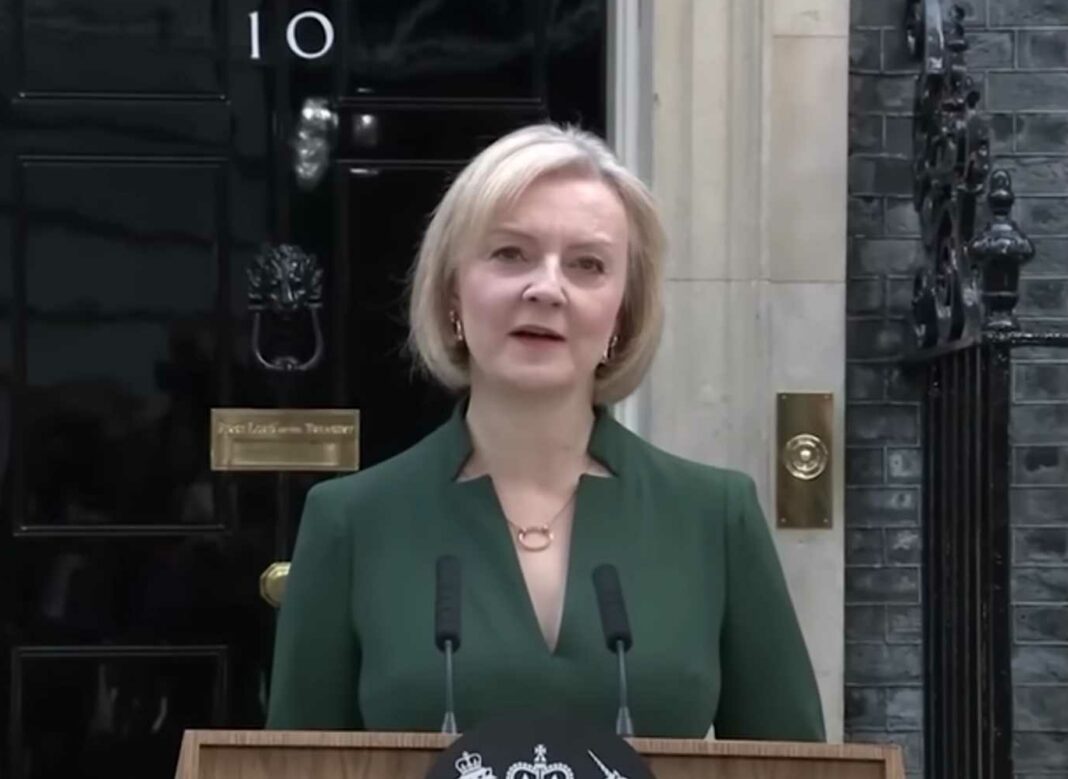29 OCTOBER 2022 | ANALYSIS
As Prime Minister, Liz Truss will always be known as the shortest-serving leader of our country, not only in living memory, but in British history. But how will her premiership be remembered?
A superficial case to make might be that Prime Ministers entering office either during or just before a crisis tend to break down into two broad categories: the ones who knew what they were taking on, and the ones who did not. But as ever, the reality is more complicated than that.
Perhaps the fairest defence of any Prime Minister – of any political colour – is that none of them are clairvoyant.
If we were to limit ourselves to just those who assumed office during the present century, we would take Gordon Brown as our first example. Although some commentators or fellow politicians (such as the later Coalition Business Secretary, Vince Cable) might acidly suggest that he ought to have known what was coming in the financial markets – especially given the government of the time’s own role in it – he evidently did not. Then again, it would be remiss to ignore his own world-leading role in attempting to fix it. History will decide.
His successor, David Cameron, cobbled together a coalition with the Liberal Democrats in 2010 before going on to win a majority in 2015, only to follow this just one year later with a referendum on Britain’s membership of the European Union that ultimately cost him his premiership. He could either be remembered as the man who cravenly lacked the backbone to deliver upon his own promise to implement whatever the nation decided, or as the man who, in the national interest, wisely decided to leave that job to someone who actually believed in it – in either case, mere hours after the vote. History will decide.
He was succeeded by Britain’s second female Prime Minister. It could be fairly argued that Theresa May knew full well the chalice she was drinking from was a poisoned one – but with the uncertainty of the times, nobody really knew just how much arsenic there was in the wine. History will decide.
In the end, once she had lost her authority and the parliamentary Conservative Party moved from chewing her up to spitting her out, along came Boris Johnson. His case is rather more complex; he did know what he was taking on in terms of Brexit. He did not know that right around the next corner was Covid.
His own defenestration came once, after practically a lifetime of playing it fast and loose with the truth, he actually told it – “a bad mistake”, as he admitted. The Pincher scandal was the last in a series that finally did for Johnson, after a year and a half of making decision after decision of a nature that neither he, nor anyone else mere months before the pandemic struck, could ever have imagined. History will decide.
And then we come to Liz Truss – Britain’s shortest-serving Prime Minister. Her message, as convincingly voted for by the Conservative Party membership, was essentially to tell certain people – be they certain wings of her own party, or certain players in the financial markets – that what they wanted, they couldn’t have. But as she spoke to the press and the nation on the steps of Number 10 just seven weeks later to resign her premiership, it was clear that it was in fact others who had told her the same thing – and in the end, they won out.
Was it incompetent comms? Was it a message that might have been right for a different time, but not this one? Or was it more the case that she was in fact right after all, but being right alone is not enough to keep you in power? History will decide.
On the point of comms, it is worth just briefly noting that the responsibility of the receiver to interpret with a clear head is just as incumbent upon them as is the responsibility upon the communicator to convey themselves correctly – it is, after all, a two-way street.
It is further worth noting that the markets – as well as the Bank of England – can hardly claim not to have been aware in advance that the proposals for energy bill relief propounded by the clear front-runner in the contest were set to be unfunded. Granted, she wisely did not use that word herself during her leadership campaign, but her point that “you can’t tax your way to prosperity” to counter her rival Rishi Sunak’s point that “you can’t borrow your way to prosperity” was one that came up several times during this summer’s hustings.
Besides which, when you are also vocally campaigning on a platform of taking a penny off the pound in income tax, reversing a recent rise in National Insurance, cancelling a planned increase in Corporation Tax and slashing stamp duty, perhaps they were never realistically going to be anything other than unfunded.
But as to her broader message: the Conservative Party would “deliver, deliver, deliver”. This was the promise Truss made to the public when she ascended to the leadership only weeks before, defeating her rival and now successor by more than 20,000 votes amongst the party membership.
She promised to “deliver a bold plan to cut taxes and grow our economy [and] deliver on the energy crisis, dealing with people’s energy bills…
“I will make sure we use all the fantastic talents of the Conservative Party.”
But on the contrary, the ‘mini-Budget’ she delivered – almost immediately in her tenure – to combat the cost-of-living crisis contributed to a plunge in the pound and caused people’s mortgages to skyrocket, although it would be unfair to say this had not already been on the cards in the markets.
For many voters, she will be remembered as the person responsible for this, even though while some commentators might say her government acted too quickly – “further and faster”, as she herself put it – others might say that the Bank of England acted too slowly. Either way, she will almost certainly be remembered as the Prime Minister who sacked her Chancellor for implementing her own agenda.
The extent to which she may have defenestrated herself, as opposed to whether she was deliberately defenestrated by others, will most likely become the subject of university essays long into the future – as could equally be echoed in the the case for or against her immediate predecessor.
But in fairness, Rishi Sunak, in Number 10 today, did indeed predict this as the result of ‘Trussonomics’ over the long weeks of the summer’s leadership contest – and as far as the optics of Westminster, Whitehall, the City and Fleet Street go, he was proven right. In spite of his forecast, however, part of why she was voted in by the membership was because Sunak was painted as the traitor who, in part, caused the downfall of Boris Johnson in resigning as Chancellor – a role he was deemed to have been popular and successful in filling.
However, the members’ decision to install Truss in his stead has ultimately caused huge damage to the party’s reputation for both stability and economic competence. After 12 years in government, it has resulted in internal party disunity and political instability – precisely the opposite of its intention. Many of the members who have now effectively been ‘told they were wrong’ will also now question the point of even bothering to hold a leadership election – under the current rules, at least – in the future.
Her tenure has also damaged the Libertarian wing of the party. To many, Truss’ ideologically-driven, Thatcherite vision for ultra-free markets has worsened the cost-of-living crisis and damaged the Conservatives’ former monopoly on economic competence. With that said, for those who remember the ERM crisis of the 90s, this would not be the first time that has happened.
Her plan to guide Britain through the cost-of-living and energy crises, which was introduced through her ‘mini-Budget’, has since been ripped up by new Chancellor Jeremy Hunt, a Minister widely deemed competent and capable, if not well-liked in public sector circles.
The result? If it does not kick her out of Parliament at the next election, it will likely confine her to the backbenches indefinitely. It may even cost the Tories the next election.
And in spite of promising to bind the “talents” of the party together in the interest of representing the Tories’ “broad church” narrative, she instead filled her Cabinet with her own supporters, perhaps trading competence for loyalty. Ironically, this was also an accusation flung at her predecessor, particularly for his first Cabinet.
However, Truss’ premiership was difficult right from her ascension. Just two days after she was invited to meet Queen Elizabeth to form a government, the British monarch died, leaving a remarkable 70-year-long legacy in her wake.
For any Prime Minister, this was always going to be tough job to oversee – not least having only been officially in the role for a matter of days. The Queen’s death also meant that government business had to be postponed for the 10-day national mourning period. Truss handled this with the decorum that would have been expected of a more experienced PM, which is to her credit.
In addition, just as she pledged in her pitch to become Conservative leader, she took immediate action to aid people with their energy bills, whereas the successor to her first choice for Chancellor is currently saying he is only willing to sustain this for another six months in its current form. However, voters will likely not remember this by the next election – although some amongst them may well come to regret the departure of Truss and her policies in April.
She did also reverse Boris Johnson’s unpopular and controversial decision to increase National Insurance contributions by 1.25% as a funding mechanism for social care. This will be one U-turn that voters will be thankful for, but it may be overshadowed by the fact that people will potentially be paying more for their mortgages, and for longer overall, in the years ahead – in a counterpoint to the above.
Ultimately, the legacy of the Truss Government – as brief as it was – is unlikely to be one that is remembered with any great degree of fondness, and it gifts ample room for the Labour Opposition – the “government-in-waiting”, as Sir Keir Starmer says – to manoeuvre to drum the notion into the electorate that time is now up for the Tory Party in office.
The voters will decide. And then, as ever, history will decide.
















